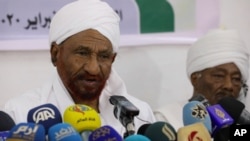Flags across Sudan are flying at half-staff after former prime minister Sadiq al-Mahdi, who was overthrown in the 1989 coup that brought Omar al-Bashir to power, died of COVID-19 on Thursday.
Al-Mahdi, who was 85 according to a statement released Thursday by the Umma Party, was airlifted to the United Arab Emirates earlier this month after he and 21 members of his family and his party tested positive for COVID-19 in Khartoum.
Al-Mahdi was treated at an Abu Dhabi hospital for more than two weeks before he died.
His body is expected to arrive in Khartoum Friday morning and will be laid to rest in al-Mahdi’s cemetery in Omdurman. The Sudanese transitional government has declared three days of mourning.
Many Sudanese described al-Mahdi’s death as a great loss for the country.
Abdulrrazik Kas, a resident of the Nyala area in South Darfur state, said it would be difficult to discuss Sudan's history without mentioning al-Mahdi’s contribution towards building a democratic country.
“When you look at the Sudanese political history you will see his contributions, despite being a point of criticism for many. He is one of the critical minds in Sudan throughout his legacy in Sudanese politics or in his political party,” Kas told VOA’s South Sudan in Focus.
Manal Awad Khawjali, who heads the Sudanese National Women Union, a coalition of women’s groups, called al-Mahdi an icon of human rights, a staunch defender of women’s rights in particular, and a great scholar.
“He has a lot of contribution towards defending women’s rights and other concerns. He wrote a lot of books on religion and politics among others. He always thinks about the future,” Khawjali told South Sudan in Focus.
Eastern Nile resident Nejmuddeen al-Biseirri, who said he was shocked to hear of al-Mahdi’s death, told South Sudan in Focus he considers the former prime minister “an icon of leadership” and “a great political and religious scholar who always stuck to his values.”
Al-Mahdi was born on December 25, 1935 in Omdurman, west of Khartoum. He was Sudan’s last democratically elected prime minister.





